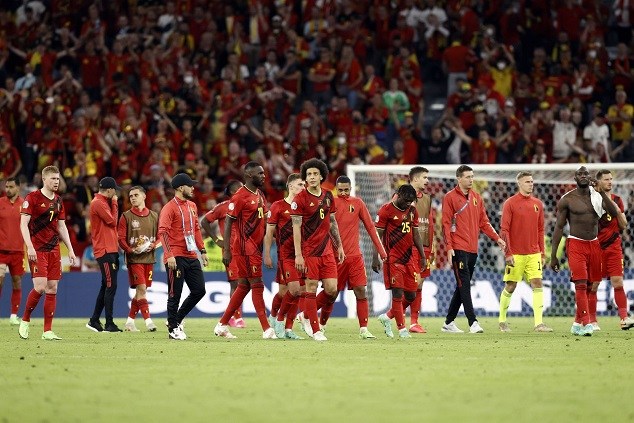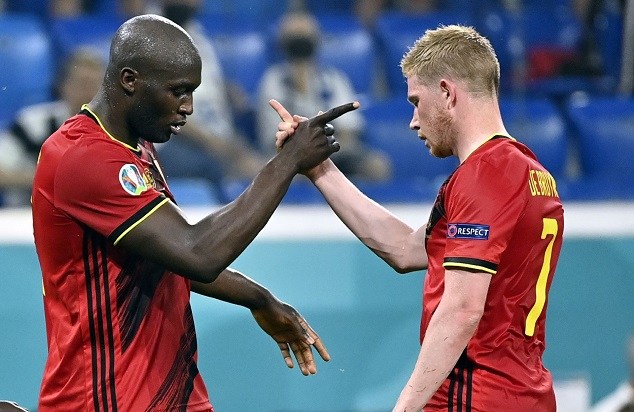Euro 2020 seemed like Belgium’s best-ever chance to win a major tournament, but after their deflating defeat in the quarter-finals, they are once again wondering if they will ever win the titles they dream of. Martin Banks looks at what is next for the supposedly golden generation of Red Devils.
When Belgium bowed out unceremoniously from this summer’s Euro 2020 football tournament, you might have expected a national outpouring of grief mixed with angst.
Many expected the Red Devils to win the championships, but they exited at a relatively early stage, in the quarter-finals to eventual winners Italy. It should have triggered a period of intense introspection about the shortcomings of football in Belgium.
But this is Belgium, a country where most things in life, including the ecstasy and agony of sporting fortunes, are taken in equal measure. If the country ran out of beer, that might be a different thing altogether.
Still, it is the right time to put a foot on the ball for a moment and consider just where Belgium football goes from here. Have the much-vaunted ‘golden generation’ reached their peak, or can the lads in red do better in next year’s World Cup in Qatar? What, or more specifically who, comes next?
Let’s start with understanding some of the reasons for Belgium’s underwhelming performance. Part of it can be explained by midfield dynamo Kevin De Bruyne being unfit, and captain Eden Hazard watching on from the bench. But there was a more general lethargy to the squad – and a naiveness in the face of Italy’s ruthless physical game.
Speaking a week after the quarter-final defeat, coach Roberto Martinez said the whole team was tired. “We weren’t ourselves against Italy,” he said. That is to Italy’s credit. I did learn that we suffered from fatigue. We had to travel a lot, while Italy played most of its matches in Rome.”

© Belga
Martinez defended the Red Devils: “they won four matches and beat the 2016 European champions, Portugal. Yet even with these mitigating circumstances, this tournament ended in a big anti-climax.”
Still, we can’t redo Euro 2020. But we can learn the lessons. And here, it is probably useful to rewind to June 19, 2000, when a familiar feeling of aching disappointment hung in the air as then-Euro 2000 hosts Belgium left their own party early after another premature exit.
Sound familiar?
Yet in the wake of their first-round elimination, Belgium revamped its footballing model, turning toward 4-3-3 formations all the way down to the youth teams, with an emphasis on individual skills. Coaching has improved at all levels, and the Belgian Football Centre in Tubize is an impressive a coaching facility as you’ll find anywhere.
In the following years, the team’s results improved: a quarter-final at the 2014 World Cup and a quarter-final at Euro 2016 followed by a semi-final and bronze medal at the 2018 World Cup.
In 2015, Belgium, a country of barely 11 million, made it to the top of the FIFA World Rankings. Although that first stint only lasted a few months, the Red Devils returned to the number one position in late 2018, and are still there, despite their under-par performance this summer.
Fast forward to the present and, with the domestic season already underway, all eyes now shift to the World Cup in Qatar 2022.
Martinez, who stays on as the coach, still has some world class players at his disposal, as well as a talented group of youngsters ready to make their mark at senior international level. Martinez and others expect these to push their more experienced counterparts for regular game time in the years to come.
There are about 12 young players who are already involved in the national team, four of them already having played several times, such as Jeremy Doku (the stand-out player in the defeat to Italy), Zinho Vanheusden, Charles De Ketelaere and Yari Verschaeren.
The next 12 months will be important for this new crop, not least as they will be competing with the older guard, most of whom probably have no intention of hanging up their international boots just yet. But Belgium needs to renew: no less than nine outfield players in the Euro 2020 squad were over 30, even if the conveyor belt of Belgian talent production rolls on.
As with most things in Belgium though, national sport progresses through evolution not revolution, as Royal Belgian FA CEO Peter Bossaert points out. “We want to continue our growth and become one of the leading federations by 2022,” he says.
So, does the current crop have one last swansong in them at the World Cup in Qatar? Sebastien Delestienne, a coach at Braine l’Alleud is committed to the Belgian approach, working at grassroots level to nurture the next golden generation. “Youth training in Belgium has been very good for many years,” he says. “But when, or even if, we will see another golden generation like this one to emerge is anyone’s guess.”
Like many others, Delestienne was disappointed that Belgium did not go all the way to the final at Euro 2020. “But they did their best, I guess,” he says. “We still have some very talented and committed young players in our squad. I remain very confident about the future of the game here.”
By Martin Banks

